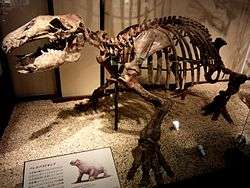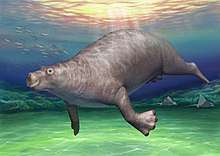Paleoparadoxia
Paleoparadoxia ("ancient paradox") is a genus of large, herbivorous aquatic mammals that inhabited the northern Pacific coastal region during the Miocene epoch (20 to 10 million years ago). It ranged from the waters of Japan (Tsuyama and Yanagawa), to Alaska in the north, and down to Baja California, Mexico. Paleoparadoxia was about 2.2 m (7 ft 3 in) long.[5]
| Paleoparadoxia | |
|---|---|
 | |
| P. tabatai | |
| Scientific classification | |
| Kingdom: | |
| Phylum: | |
| Class: | |
| Order: | |
| Family: | |
| Genus: | Paleoparadoxia |
| Type species | |
| Paleoparadoxia tabatai | |
| Species | |
|
P. media Inuzuka 2005[3] | |
Description

Paleoparadoxia is thought to have fed primarily on seaweeds and sea grasses. The jaws and the angle of the teeth resemble a backhoe bucket. Its bulky body was well adapted for swimming and underwater foraging. Originally interpreted as amphibious, Paleoparadoxia is now thought to have been a fully marine mammal like their living relatives, the sirenians, spending most of their lives walking across the sea bottom like marine hippos.[6] Studies on its habitat preference show that it favoured deep, offshore waters.[7]
Tokunaga 1939 named the genus Cornwallius but Reinhart 1959 synonymized it as a species of Paleoparadoxia.[8]
References
| Wikimedia Commons has media related to Paleoparadoxia. |
- Paleoparadoxiidae in the Paleobiology Database. Retrieved March 2013.
- Paleoparadoxia in the Paleobiology Database. Retrieved March 2013.
- Paleoparadoxia media in the Paleobiology Database. Retrieved March 2013.
- "Yoshiwara, Shigeyasu". Sirenia.org. Retrieved 11 March 2013.
- Kemp 2005, p. 254
- Hayashi et al. 2013
- Kumiko Matsui; Katsuo Sashida; Sachiko Agematsu; Naoki Kohno (1 April 2017). "Habitat preferences of the enigmatic Miocene tethythere Desmostylus and Paleoparadoxia (Desmostylia; Mammalia) inferred from the depositional depth of fossil occurrences in the Northwestern Pacific realm". Palaeogeography, Palaeoclimatology, Palaeoecology (471): 254–265. doi:10.1016/j.palaeo.2017.02.005. ISSN 0031-0182.CS1 maint: uses authors parameter (link)
- "OPINION 2232 (Case 3384) Cornwallius tabatai Tokunaga, 1939 (currently Paleoparadoxia tabatai; Mammalia, Desmostylia): proposed designation of a neotype not accepted". ICZN. Retrieved 11 March 2013.
Bibliography
- Clark, J. M. (1991). "A new early Miocene species of Paleoparadoxia (Mammalia: Desmostylia) from California". Journal of Vertebrate Paleontology. 11 (4): 490–508. doi:10.1080/02724634.1991.10011417. OCLC 4908959659.CS1 maint: ref=harv (link)
- Domning, D. P.; Barnes, L. G. (2007). "A new name for the 'Stanford Skeleton' of Paleoparadoxia (Mammalia, Desmostylia)". Journal of Vertebrate Paleontology. 27 (3): 748–751. doi:10.1671/0272-4634(2007)27[748:annfts]2.0.co;2. OCLC 4630515072.CS1 maint: ref=harv (link)
- Hayashi, Shoji; Houssaye, Alexandra; Nakajima, Yasuhisa; Chiba, Kentaro; Ando, Tatsuro; Sawamura, Hiroshi; Inuzuka, Norihisa; Kaneko, Naotomo; Osaki, Tomohiro (2013). "Bone Inner Structure Suggests Increasing Aquatic Adaptations in Desmostylia (Mammalia, Afrotheria)". PLOS ONE. 8 (4): e59146. doi:10.1371/journal.pone.0059146. PMC 3615000. PMID 23565143.CS1 maint: ref=harv (link)
- Inuzuka, Norihisa (2005). "The Stanford Skeleton of Paleoparadoxia (Mammalia: Desmostylia)". Bulletin of the Ashoro Museum of Paleontology. 3: 3–110.CS1 maint: ref=harv (link)
- Kemp, Tom S. (2005). The Origin and Evolution of Mammals. Oxford University Press. ISBN 0198507615. OCLC 56652579.CS1 maint: ref=harv (link)
- Reinhart, Roy Herbert (1959). "A review of the Sirenia and Desmostylia". University of California Publications in Geological Sciences. 36 (1): 1–146. OCLC 3474601.CS1 maint: ref=harv (link)
- Tokunaga, Shigeyasu (1939). "A new fossil mammal belonging to the Desmostylidae". Jubilee publication commemorating Prof. H. Yabe, M.I.A. sixtieth birthday. 1. Sendai (Japan): Tohoku Imperial University, Inst. Geol. Pal. pp. 289–299. Retrieved 11 March 2013.CS1 maint: ref=harv (link)